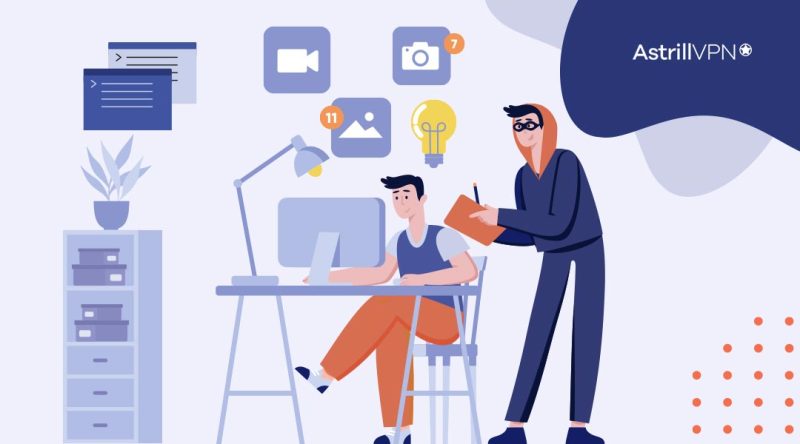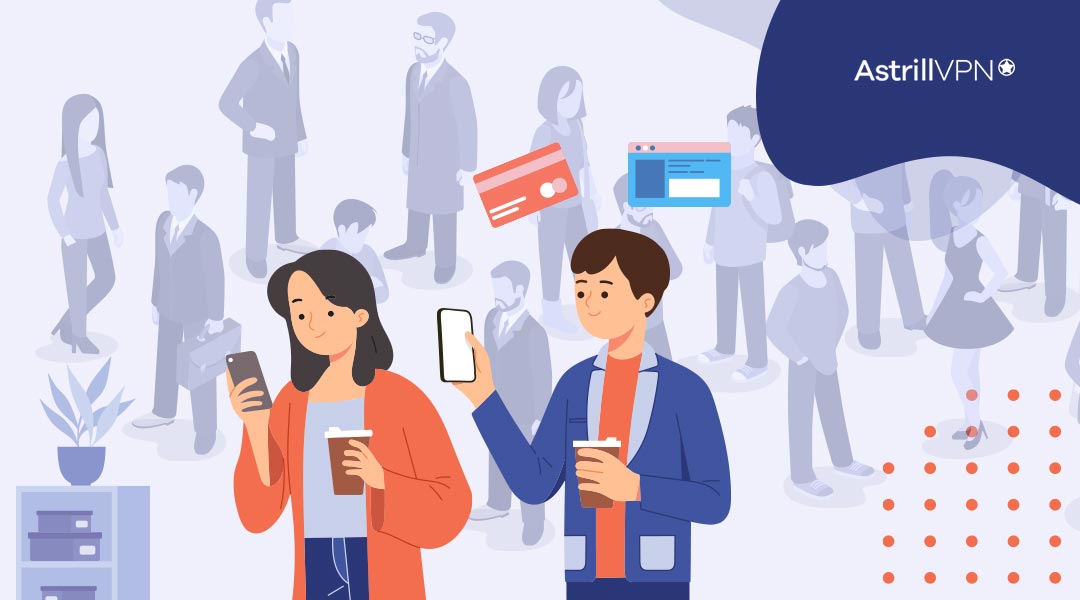What is a Shoulder Surfing Attack: Understanding Threat & Defense

Hey there, ever had the feeling someone was looking over your shoulder while you entered your password or PIN? That uncomfortable sense of being watched can be a sign your personal information is at risk from shoulder surfing.
Shoulder surfing definition is when someone spies on you to steal your data or account access. They lurk nearby and peer over your shoulder or use mirrors, cameras, or binoculars to see passwords, PINs, account numbers, or other sensitive details as you enter them.
Once shoulder surfers have your login credentials or financial data, they can access your accounts or steal your identity. The threat is real, but the good news is there are some simple ways you can outsmart shoulder surfing and better protect your information. Read on to learn what is shoulder surfing in cyber security, how to define shoulder surfing, what shoulder surfing meaning, and how to take action to avoid becoming a victim.
Table of Contents
ToggleWhat Is Shoulder Surfing Attack and How Does It Work?

Shoulder surfing attack refers to when someone spies on you to obtain sensitive information like passwords, PINs, or credit card numbers. Shoulder surfing is a serious threat, but with vigilance and caution, you can help prevent becoming a victim. Look around next time you’re entering important information in a public place. Now you know what is shoulder browsing and can easily arm yourself with information.
How Shoulder Surfing works?
A shoulder surfer casually observes over your shoulder as you enter confidential data, then steals that information for malicious use like identity theft. They rely on your distraction and trust in public to peer at your screen or keypad.
- Shoulder surfers often strike in crowded areas like coffee shops, airports, or train stations where people are preoccupied and less likely to notice someone peeking at their devices.
- They look for easy targets like those focused on their screens with their backs turned to the room or with their devices clearly visible to prying eyes.
- Once they obtain data like an account number or password, shoulder surfers may use it immediately or sell it to other criminals on the dark web.
- Some shoulder surfers use binoculars or small cameras to spy on screens from afar, so be aware of your surroundings.
How to Prevent Shoulder Surfing?
For shoulder surfing prevention, you’ll want to be extremely cautious of your surroundings in public and take measures to safeguard your information.
Be cautious at ATMs
ATMs are a prime target for shoulder surfers. When you enter your PIN or withdraw cash at an ATM, be aware of your surroundings of ATM shoulder surfers. Look for people loitering nearby or pointing cameras in your direction. Shield the keypad with your other hand as you enter your PIN to block hidden cameras above the ATM. Consider using ATMs inside bank vestibules whenever possible, as they typically have more security cameras.
Stay vigilant in Restaurants
Dining out exposes you to shoulder surfing risks. Unscrupulous servers or staff may try to steal your payment card information when processing your bill. They can use handheld skimmers to steal your card data or capture photos of your card. Ask to have your card swiped in front of you instead of taken away. Monitor your statements regularly for unauthorized charges.
Be wary of Public Wi-Fi
Free public Wi-Fi to access sensitive accounts or enter personal information is risky. Shoulder surfers set up fake free Wi-Fi hotspots to steal network login credentials, account numbers, passwords, and more. Use a VPN to surf the web safely on public networks, like Astrill. A VPN or virtual private network encrypts all the data you send and receive on public Wi-Fi. AstrillVPN masks your online activity and hides your location, giving you anonymity and security over unsecured connections.
With AstrillVPN service activated, hackers and data thieves won’t be able to see what you’re doing or access your accounts. Astrill uses military-grade encryption to create a private tunnel between you and the internet, blocking anyone from monitoring or logging your web activity.
Pay attention to POS terminals
POS terminals where you swipe or tap your credit card are also vulnerable. Shoulder surfers observe customers paying for goods and services to steal credit card numbers, expiration dates, and CVV codes. Pay close attention when using your card and cover the keypad to block the view of prying eyes.
Choose passwords wisely
Select strong, unique passwords that contain a random mix of letters, numbers, and symbols that aren’t easy to guess. Don’t reuse the same password across sites and accounts. Using a password manager app can help generate and remember complex passwords.
Be discreet in public
Avoid conducting sensitive activities like online banking, shopping, or bill paying on public Wi-Fi networks or computers. Position your screen so that it can’t be seen by others. Use a privacy screen protector if possible. Don’t leave sensitive documents or devices unattended in public places.
Use two-factor authentication when available
Two-factor authentication, like SMS text message codes or authentication apps, adds an extra layer of security for your accounts and devices. Enable two-factor authentication on financial websites, email, social media, and anywhere else.
Watch out for prying eyes
Be vigilant about who is around you, especially when entering passwords, credit card numbers, or other sensitive data. Look for people obviously peering over your shoulder or angling devices like phones or cameras in your direction. If anything feels off, change locations or come back another time.
Stay up-to-date on new threats
As technology and hacking techniques become more advanced, new variations of shoulder surfing and other cyber risks frequently emerge. Stay up-to-date on the latest online security threats by following trusted websites and news sources. The more informed you are, the better prepared you’ll be to thwart would-be shoulder surfers.
Countermeasures
Some effective ways to deter shoulder surfing include:
- Use RFID-blocking sleeves or wallets to shield contactless payment cards.
- Choose passwords and PINs that are hard to guess by observing your keystrokes.
- Be wary of who is behind or near you in lines or crowded places.
- Shield keypads and screens with your hand or body when entering sensitive data in public.
- Only access personal accounts and sensitive data on verified secure Wi-Fi networks.
- Monitor financial accounts and statements regularly for signs of fraud.
Shoulder Surfing vs. Other Social Engineering Attacks
Shoulder surfing social engineering differs from other common social engineerings attacks like phishing or baiting. With shoulder surfing, the attacker is physically present and observing their target in person. They’re looking over your shoulder to glimpse sensitive data like passwords, PINs, or account numbers as you enter them.
Low Tech but Effective
Shoulder surfing is a low-tech method of stealing data that can reap high rewards. All the attacker needs is their eyes and ears – no hacking required. While technology has made data more vulnerable, the human element is still the weakest link. Our tendency to focus on the task, like entering a password, makes us less likely to notice someone peering over our shoulder.
Defense Against Prying Eyes
Staying vigilant and taking proactive steps to safeguard your information will reduce the risk of becoming a victim of shoulder surfing. While no defense is 100% foolproof, making it as difficult as possible for attackers to access your accounts and devices is the best way to thwart their prying eyes.
FAQ: Frequently Asked Questions About Shoulder Surfing
Shoulder surfing can allow attackers to see sensitive data like:
● Passwords, PINs, and login credentials
● Credit card numbers
● Social Security numbers
● Private messages and emails
Any information you view on your screen or enter into a device like an ATM machine or payment terminal can potentially be seen by shoulder surfers.
Attackers can shoulder surf virtually anywhere, including:
1. Public places like coffee shops, libraries, and airports
2. ATM machines and retail checkout lines
3. Workplaces like offices, cubicles, and conference rooms
Any location where you are using a digital device in view of others puts you at risk of having your information compromised through shoulder surfing.
There are two main types of shoulder surfing:
● Direct observation: The attacker directly watches over your shoulder as you enter login credentials, passwords, or view sensitive information on your screen.
● Recording devices: The attacker uses a camera, video recorder or other device to capture photos, video or footage of you entering or viewing sensitive data which they access later. Some attackers may use hidden cameras for this purpose.
The methods may differ but the end goal of shoulder surfing is always the same to obtain private information that does not belong to them. Being aware of the threat of shoulder surfing and taking measures to prevent it can help reduce your risk of becoming a victim.
Conclusion
Now you know the ins and outs of shoulder surfing attacks. While they may sound like something out of a spy thriller, these stealthy peeks at your information are a real threat in today’s world. The good news is there are some simple steps you can take to protect yourself. Your information is valuable, so stay vigilant and guard it well. With the right precautions, you can surf the web worry-free, without constantly looking over your shoulder.


No comments were posted yet